Entrepreneurship Report: Analysis of Lapo Elkann's Business Ventures
VerifiedAdded on 2021/02/20
|9
|2476
|19
Report
AI Summary
This report delves into the entrepreneurial journey of Lapo Elkann, examining the factors that motivated him to become a successful businessman. It explores various aspects including his passion, self-reliance, and drive for personal growth, highlighting how these elements contributed to his achievements. The report then discusses several entrepreneurship theories, including psychological, sociological, and economic perspectives, and how they relate to Elkann's approach. Specifically, it analyzes the psychological theory, focusing on his vision, ability to face opposition, and how he applied motivational theories like McCelland's and Rotter's locus of control. The sociological theory, focusing on social values, and the economic theory, considering the impact of economic conditions are also discussed. The report concludes that by understanding and applying these theories, entrepreneurs can make effective decisions and achieve success, as exemplified by Lapo Elkann's career. The report emphasizes the importance of adapting to market conditions and understanding social dynamics for sustained entrepreneurial success.

Entrepreneurship
Paraphrase This Document
Need a fresh take? Get an instant paraphrase of this document with our AI Paraphraser

Table of Contents
INTRODUCATION........................................................................................................................1
MAIN BODY...................................................................................................................................1
CONCLUSION................................................................................................................................6
REFERENCES................................................................................................................................7
INTRODUCATION........................................................................................................................1
MAIN BODY...................................................................................................................................1
CONCLUSION................................................................................................................................6
REFERENCES................................................................................................................................7
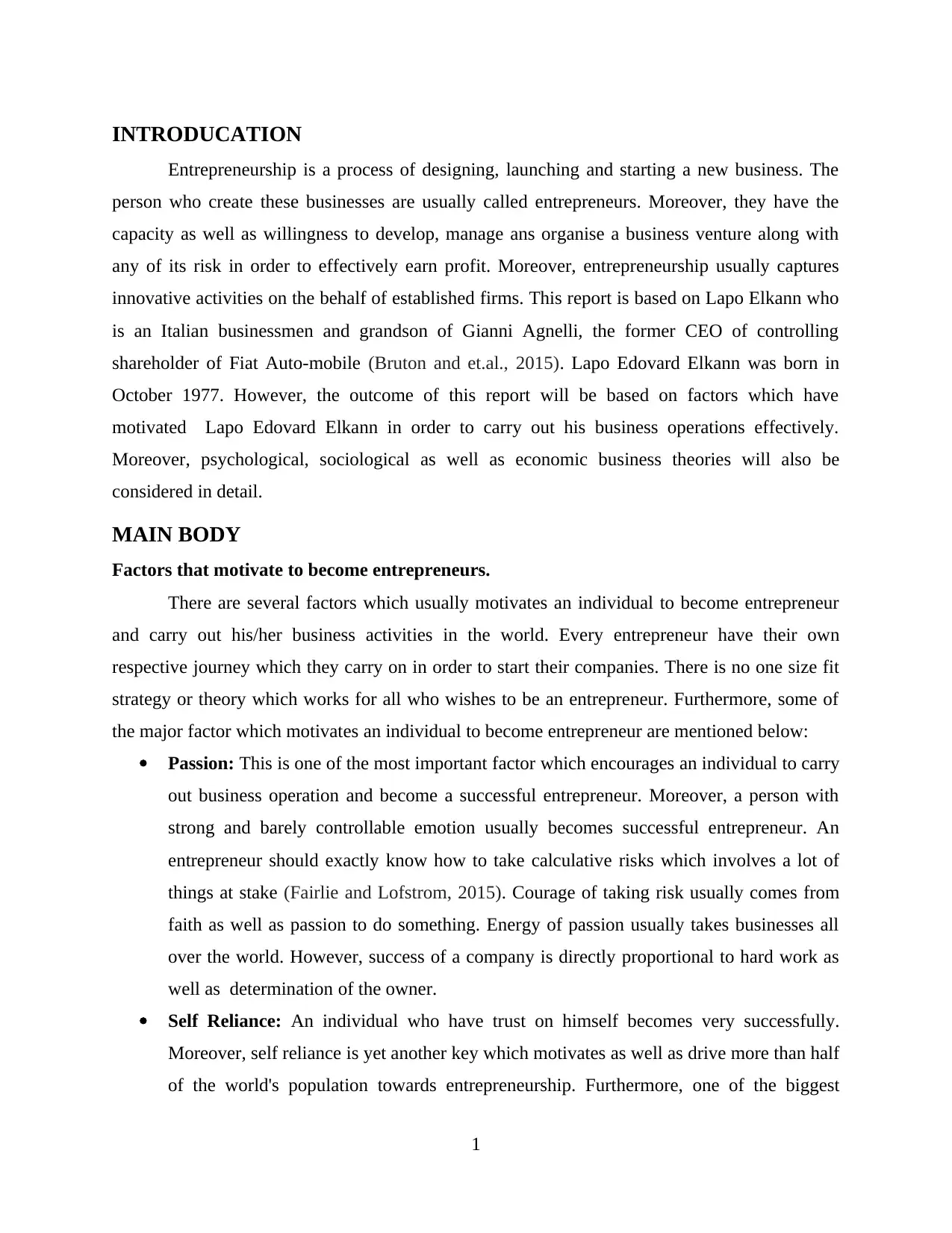
INTRODUCATION
Entrepreneurship is a process of designing, launching and starting a new business. The
person who create these businesses are usually called entrepreneurs. Moreover, they have the
capacity as well as willingness to develop, manage ans organise a business venture along with
any of its risk in order to effectively earn profit. Moreover, entrepreneurship usually captures
innovative activities on the behalf of established firms. This report is based on Lapo Elkann who
is an Italian businessmen and grandson of Gianni Agnelli, the former CEO of controlling
shareholder of Fiat Auto-mobile (Bruton and et.al., 2015). Lapo Edovard Elkann was born in
October 1977. However, the outcome of this report will be based on factors which have
motivated Lapo Edovard Elkann in order to carry out his business operations effectively.
Moreover, psychological, sociological as well as economic business theories will also be
considered in detail.
MAIN BODY
Factors that motivate to become entrepreneurs.
There are several factors which usually motivates an individual to become entrepreneur
and carry out his/her business activities in the world. Every entrepreneur have their own
respective journey which they carry on in order to start their companies. There is no one size fit
strategy or theory which works for all who wishes to be an entrepreneur. Furthermore, some of
the major factor which motivates an individual to become entrepreneur are mentioned below:
Passion: This is one of the most important factor which encourages an individual to carry
out business operation and become a successful entrepreneur. Moreover, a person with
strong and barely controllable emotion usually becomes successful entrepreneur. An
entrepreneur should exactly know how to take calculative risks which involves a lot of
things at stake (Fairlie and Lofstrom, 2015). Courage of taking risk usually comes from
faith as well as passion to do something. Energy of passion usually takes businesses all
over the world. However, success of a company is directly proportional to hard work as
well as determination of the owner.
Self Reliance: An individual who have trust on himself becomes very successfully.
Moreover, self reliance is yet another key which motivates as well as drive more than half
of the world's population towards entrepreneurship. Furthermore, one of the biggest
1
Entrepreneurship is a process of designing, launching and starting a new business. The
person who create these businesses are usually called entrepreneurs. Moreover, they have the
capacity as well as willingness to develop, manage ans organise a business venture along with
any of its risk in order to effectively earn profit. Moreover, entrepreneurship usually captures
innovative activities on the behalf of established firms. This report is based on Lapo Elkann who
is an Italian businessmen and grandson of Gianni Agnelli, the former CEO of controlling
shareholder of Fiat Auto-mobile (Bruton and et.al., 2015). Lapo Edovard Elkann was born in
October 1977. However, the outcome of this report will be based on factors which have
motivated Lapo Edovard Elkann in order to carry out his business operations effectively.
Moreover, psychological, sociological as well as economic business theories will also be
considered in detail.
MAIN BODY
Factors that motivate to become entrepreneurs.
There are several factors which usually motivates an individual to become entrepreneur
and carry out his/her business activities in the world. Every entrepreneur have their own
respective journey which they carry on in order to start their companies. There is no one size fit
strategy or theory which works for all who wishes to be an entrepreneur. Furthermore, some of
the major factor which motivates an individual to become entrepreneur are mentioned below:
Passion: This is one of the most important factor which encourages an individual to carry
out business operation and become a successful entrepreneur. Moreover, a person with
strong and barely controllable emotion usually becomes successful entrepreneur. An
entrepreneur should exactly know how to take calculative risks which involves a lot of
things at stake (Fairlie and Lofstrom, 2015). Courage of taking risk usually comes from
faith as well as passion to do something. Energy of passion usually takes businesses all
over the world. However, success of a company is directly proportional to hard work as
well as determination of the owner.
Self Reliance: An individual who have trust on himself becomes very successfully.
Moreover, self reliance is yet another key which motivates as well as drive more than half
of the world's population towards entrepreneurship. Furthermore, one of the biggest
1
⊘ This is a preview!⊘
Do you want full access?
Subscribe today to unlock all pages.

Trusted by 1+ million students worldwide
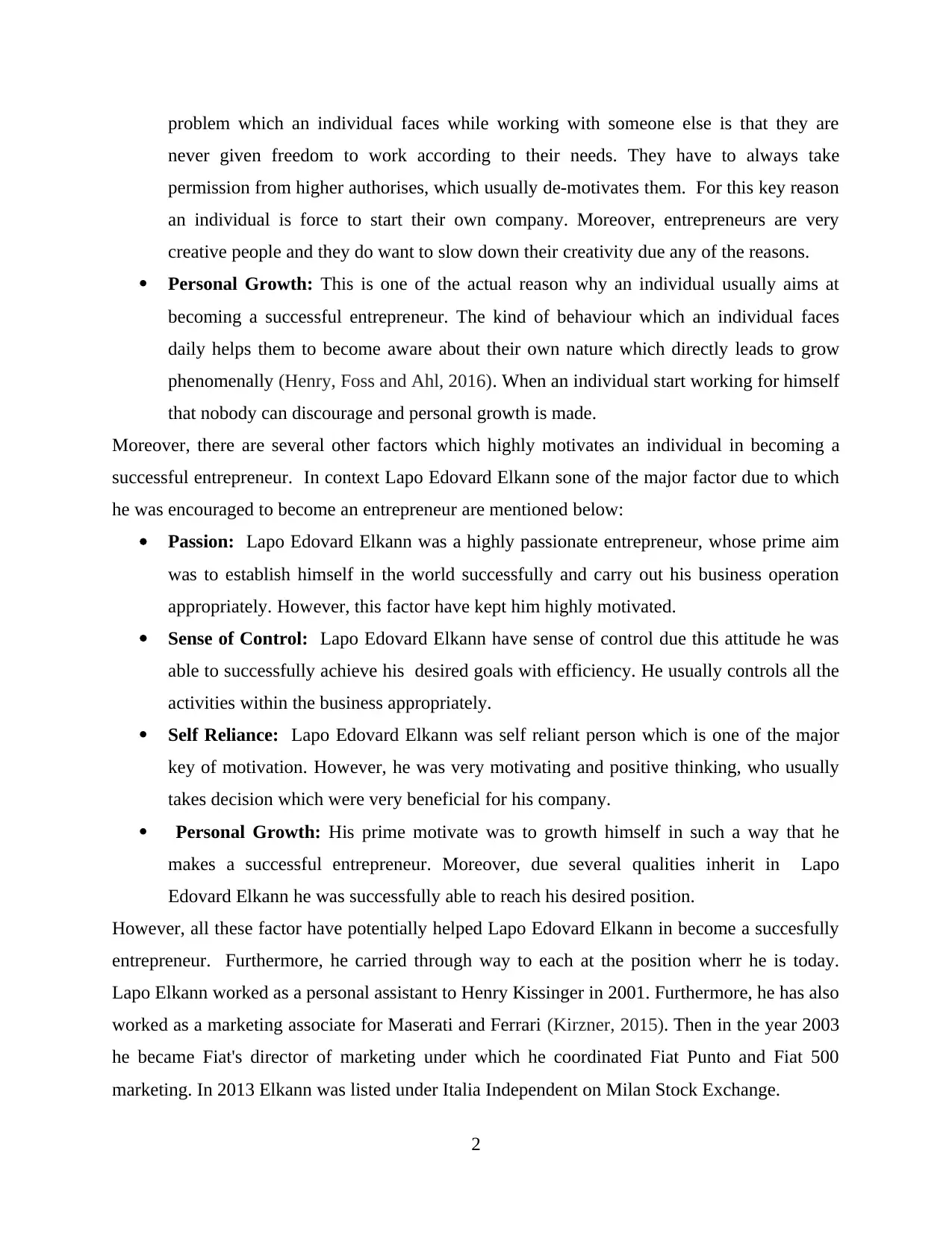
problem which an individual faces while working with someone else is that they are
never given freedom to work according to their needs. They have to always take
permission from higher authorises, which usually de-motivates them. For this key reason
an individual is force to start their own company. Moreover, entrepreneurs are very
creative people and they do want to slow down their creativity due any of the reasons.
Personal Growth: This is one of the actual reason why an individual usually aims at
becoming a successful entrepreneur. The kind of behaviour which an individual faces
daily helps them to become aware about their own nature which directly leads to grow
phenomenally (Henry, Foss and Ahl, 2016). When an individual start working for himself
that nobody can discourage and personal growth is made.
Moreover, there are several other factors which highly motivates an individual in becoming a
successful entrepreneur. In context Lapo Edovard Elkann sone of the major factor due to which
he was encouraged to become an entrepreneur are mentioned below:
Passion: Lapo Edovard Elkann was a highly passionate entrepreneur, whose prime aim
was to establish himself in the world successfully and carry out his business operation
appropriately. However, this factor have kept him highly motivated.
Sense of Control: Lapo Edovard Elkann have sense of control due this attitude he was
able to successfully achieve his desired goals with efficiency. He usually controls all the
activities within the business appropriately.
Self Reliance: Lapo Edovard Elkann was self reliant person which is one of the major
key of motivation. However, he was very motivating and positive thinking, who usually
takes decision which were very beneficial for his company.
Personal Growth: His prime motivate was to growth himself in such a way that he
makes a successful entrepreneur. Moreover, due several qualities inherit in Lapo
Edovard Elkann he was successfully able to reach his desired position.
However, all these factor have potentially helped Lapo Edovard Elkann in become a succesfully
entrepreneur. Furthermore, he carried through way to each at the position wherr he is today.
Lapo Elkann worked as a personal assistant to Henry Kissinger in 2001. Furthermore, he has also
worked as a marketing associate for Maserati and Ferrari (Kirzner, 2015). Then in the year 2003
he became Fiat's director of marketing under which he coordinated Fiat Punto and Fiat 500
marketing. In 2013 Elkann was listed under Italia Independent on Milan Stock Exchange.
2
never given freedom to work according to their needs. They have to always take
permission from higher authorises, which usually de-motivates them. For this key reason
an individual is force to start their own company. Moreover, entrepreneurs are very
creative people and they do want to slow down their creativity due any of the reasons.
Personal Growth: This is one of the actual reason why an individual usually aims at
becoming a successful entrepreneur. The kind of behaviour which an individual faces
daily helps them to become aware about their own nature which directly leads to grow
phenomenally (Henry, Foss and Ahl, 2016). When an individual start working for himself
that nobody can discourage and personal growth is made.
Moreover, there are several other factors which highly motivates an individual in becoming a
successful entrepreneur. In context Lapo Edovard Elkann sone of the major factor due to which
he was encouraged to become an entrepreneur are mentioned below:
Passion: Lapo Edovard Elkann was a highly passionate entrepreneur, whose prime aim
was to establish himself in the world successfully and carry out his business operation
appropriately. However, this factor have kept him highly motivated.
Sense of Control: Lapo Edovard Elkann have sense of control due this attitude he was
able to successfully achieve his desired goals with efficiency. He usually controls all the
activities within the business appropriately.
Self Reliance: Lapo Edovard Elkann was self reliant person which is one of the major
key of motivation. However, he was very motivating and positive thinking, who usually
takes decision which were very beneficial for his company.
Personal Growth: His prime motivate was to growth himself in such a way that he
makes a successful entrepreneur. Moreover, due several qualities inherit in Lapo
Edovard Elkann he was successfully able to reach his desired position.
However, all these factor have potentially helped Lapo Edovard Elkann in become a succesfully
entrepreneur. Furthermore, he carried through way to each at the position wherr he is today.
Lapo Elkann worked as a personal assistant to Henry Kissinger in 2001. Furthermore, he has also
worked as a marketing associate for Maserati and Ferrari (Kirzner, 2015). Then in the year 2003
he became Fiat's director of marketing under which he coordinated Fiat Punto and Fiat 500
marketing. In 2013 Elkann was listed under Italia Independent on Milan Stock Exchange.
2
Paraphrase This Document
Need a fresh take? Get an instant paraphrase of this document with our AI Paraphraser
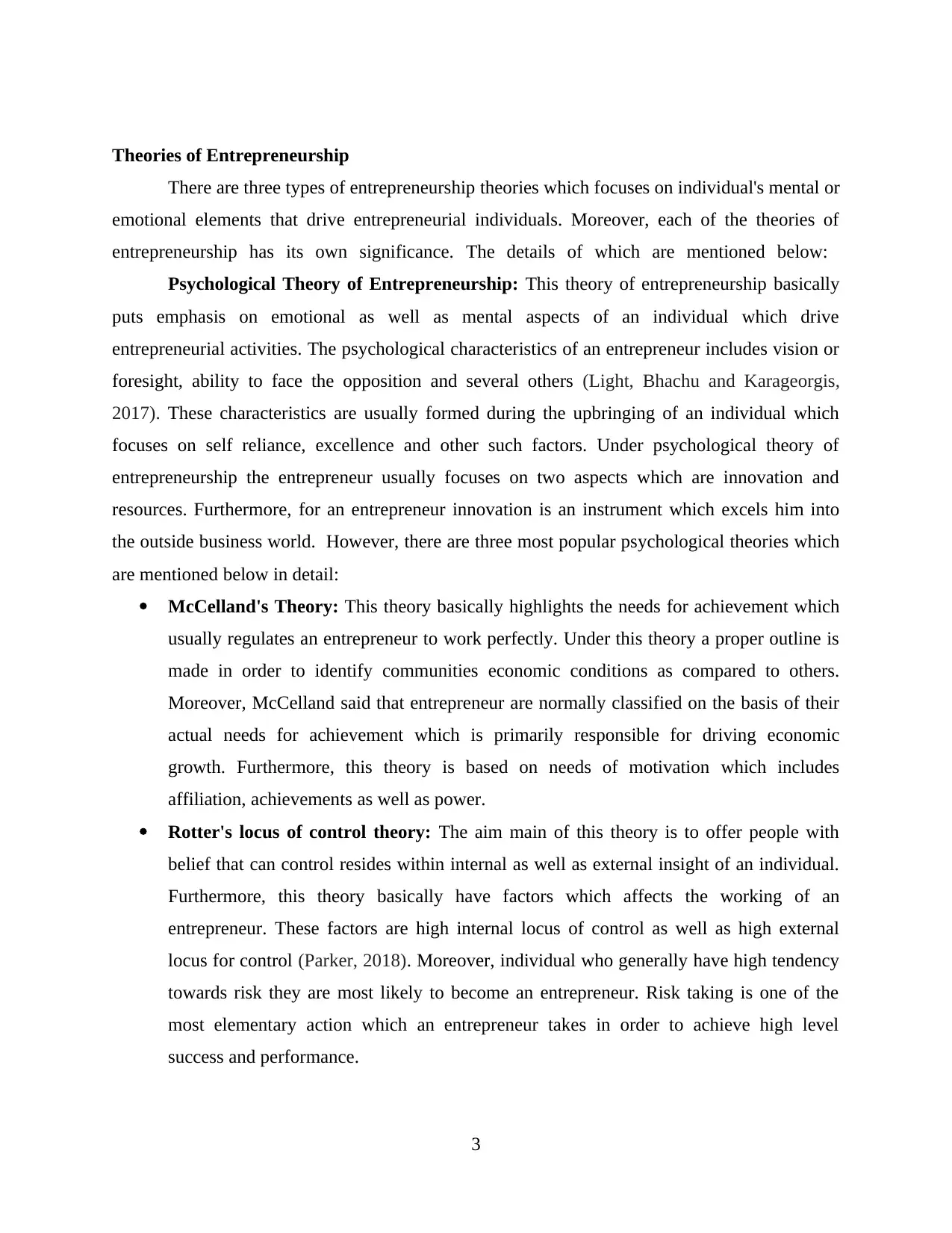
Theories of Entrepreneurship
There are three types of entrepreneurship theories which focuses on individual's mental or
emotional elements that drive entrepreneurial individuals. Moreover, each of the theories of
entrepreneurship has its own significance. The details of which are mentioned below:
Psychological Theory of Entrepreneurship: This theory of entrepreneurship basically
puts emphasis on emotional as well as mental aspects of an individual which drive
entrepreneurial activities. The psychological characteristics of an entrepreneur includes vision or
foresight, ability to face the opposition and several others (Light, Bhachu and Karageorgis,
2017). These characteristics are usually formed during the upbringing of an individual which
focuses on self reliance, excellence and other such factors. Under psychological theory of
entrepreneurship the entrepreneur usually focuses on two aspects which are innovation and
resources. Furthermore, for an entrepreneur innovation is an instrument which excels him into
the outside business world. However, there are three most popular psychological theories which
are mentioned below in detail:
McCelland's Theory: This theory basically highlights the needs for achievement which
usually regulates an entrepreneur to work perfectly. Under this theory a proper outline is
made in order to identify communities economic conditions as compared to others.
Moreover, McCelland said that entrepreneur are normally classified on the basis of their
actual needs for achievement which is primarily responsible for driving economic
growth. Furthermore, this theory is based on needs of motivation which includes
affiliation, achievements as well as power.
Rotter's locus of control theory: The aim main of this theory is to offer people with
belief that can control resides within internal as well as external insight of an individual.
Furthermore, this theory basically have factors which affects the working of an
entrepreneur. These factors are high internal locus of control as well as high external
locus for control (Parker, 2018). Moreover, individual who generally have high tendency
towards risk they are most likely to become an entrepreneur. Risk taking is one of the
most elementary action which an entrepreneur takes in order to achieve high level
success and performance.
3
There are three types of entrepreneurship theories which focuses on individual's mental or
emotional elements that drive entrepreneurial individuals. Moreover, each of the theories of
entrepreneurship has its own significance. The details of which are mentioned below:
Psychological Theory of Entrepreneurship: This theory of entrepreneurship basically
puts emphasis on emotional as well as mental aspects of an individual which drive
entrepreneurial activities. The psychological characteristics of an entrepreneur includes vision or
foresight, ability to face the opposition and several others (Light, Bhachu and Karageorgis,
2017). These characteristics are usually formed during the upbringing of an individual which
focuses on self reliance, excellence and other such factors. Under psychological theory of
entrepreneurship the entrepreneur usually focuses on two aspects which are innovation and
resources. Furthermore, for an entrepreneur innovation is an instrument which excels him into
the outside business world. However, there are three most popular psychological theories which
are mentioned below in detail:
McCelland's Theory: This theory basically highlights the needs for achievement which
usually regulates an entrepreneur to work perfectly. Under this theory a proper outline is
made in order to identify communities economic conditions as compared to others.
Moreover, McCelland said that entrepreneur are normally classified on the basis of their
actual needs for achievement which is primarily responsible for driving economic
growth. Furthermore, this theory is based on needs of motivation which includes
affiliation, achievements as well as power.
Rotter's locus of control theory: The aim main of this theory is to offer people with
belief that can control resides within internal as well as external insight of an individual.
Furthermore, this theory basically have factors which affects the working of an
entrepreneur. These factors are high internal locus of control as well as high external
locus for control (Parker, 2018). Moreover, individual who generally have high tendency
towards risk they are most likely to become an entrepreneur. Risk taking is one of the
most elementary action which an entrepreneur takes in order to achieve high level
success and performance.
3
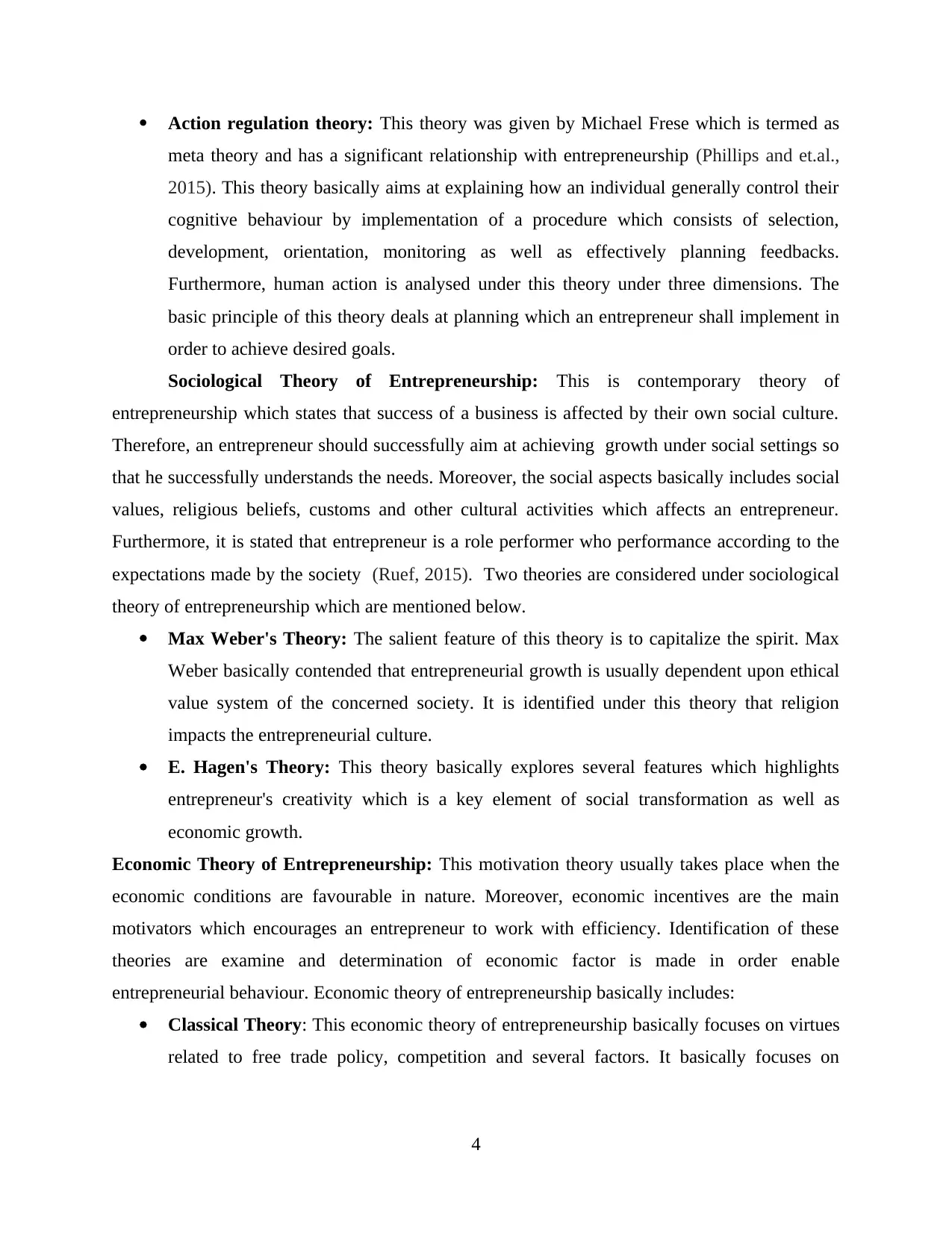
Action regulation theory: This theory was given by Michael Frese which is termed as
meta theory and has a significant relationship with entrepreneurship (Phillips and et.al.,
2015). This theory basically aims at explaining how an individual generally control their
cognitive behaviour by implementation of a procedure which consists of selection,
development, orientation, monitoring as well as effectively planning feedbacks.
Furthermore, human action is analysed under this theory under three dimensions. The
basic principle of this theory deals at planning which an entrepreneur shall implement in
order to achieve desired goals.
Sociological Theory of Entrepreneurship: This is contemporary theory of
entrepreneurship which states that success of a business is affected by their own social culture.
Therefore, an entrepreneur should successfully aim at achieving growth under social settings so
that he successfully understands the needs. Moreover, the social aspects basically includes social
values, religious beliefs, customs and other cultural activities which affects an entrepreneur.
Furthermore, it is stated that entrepreneur is a role performer who performance according to the
expectations made by the society (Ruef, 2015). Two theories are considered under sociological
theory of entrepreneurship which are mentioned below.
Max Weber's Theory: The salient feature of this theory is to capitalize the spirit. Max
Weber basically contended that entrepreneurial growth is usually dependent upon ethical
value system of the concerned society. It is identified under this theory that religion
impacts the entrepreneurial culture.
E. Hagen's Theory: This theory basically explores several features which highlights
entrepreneur's creativity which is a key element of social transformation as well as
economic growth.
Economic Theory of Entrepreneurship: This motivation theory usually takes place when the
economic conditions are favourable in nature. Moreover, economic incentives are the main
motivators which encourages an entrepreneur to work with efficiency. Identification of these
theories are examine and determination of economic factor is made in order enable
entrepreneurial behaviour. Economic theory of entrepreneurship basically includes:
Classical Theory: This economic theory of entrepreneurship basically focuses on virtues
related to free trade policy, competition and several factors. It basically focuses on
4
meta theory and has a significant relationship with entrepreneurship (Phillips and et.al.,
2015). This theory basically aims at explaining how an individual generally control their
cognitive behaviour by implementation of a procedure which consists of selection,
development, orientation, monitoring as well as effectively planning feedbacks.
Furthermore, human action is analysed under this theory under three dimensions. The
basic principle of this theory deals at planning which an entrepreneur shall implement in
order to achieve desired goals.
Sociological Theory of Entrepreneurship: This is contemporary theory of
entrepreneurship which states that success of a business is affected by their own social culture.
Therefore, an entrepreneur should successfully aim at achieving growth under social settings so
that he successfully understands the needs. Moreover, the social aspects basically includes social
values, religious beliefs, customs and other cultural activities which affects an entrepreneur.
Furthermore, it is stated that entrepreneur is a role performer who performance according to the
expectations made by the society (Ruef, 2015). Two theories are considered under sociological
theory of entrepreneurship which are mentioned below.
Max Weber's Theory: The salient feature of this theory is to capitalize the spirit. Max
Weber basically contended that entrepreneurial growth is usually dependent upon ethical
value system of the concerned society. It is identified under this theory that religion
impacts the entrepreneurial culture.
E. Hagen's Theory: This theory basically explores several features which highlights
entrepreneur's creativity which is a key element of social transformation as well as
economic growth.
Economic Theory of Entrepreneurship: This motivation theory usually takes place when the
economic conditions are favourable in nature. Moreover, economic incentives are the main
motivators which encourages an entrepreneur to work with efficiency. Identification of these
theories are examine and determination of economic factor is made in order enable
entrepreneurial behaviour. Economic theory of entrepreneurship basically includes:
Classical Theory: This economic theory of entrepreneurship basically focuses on virtues
related to free trade policy, competition and several factors. It basically focuses on
4
⊘ This is a preview!⊘
Do you want full access?
Subscribe today to unlock all pages.

Trusted by 1+ million students worldwide
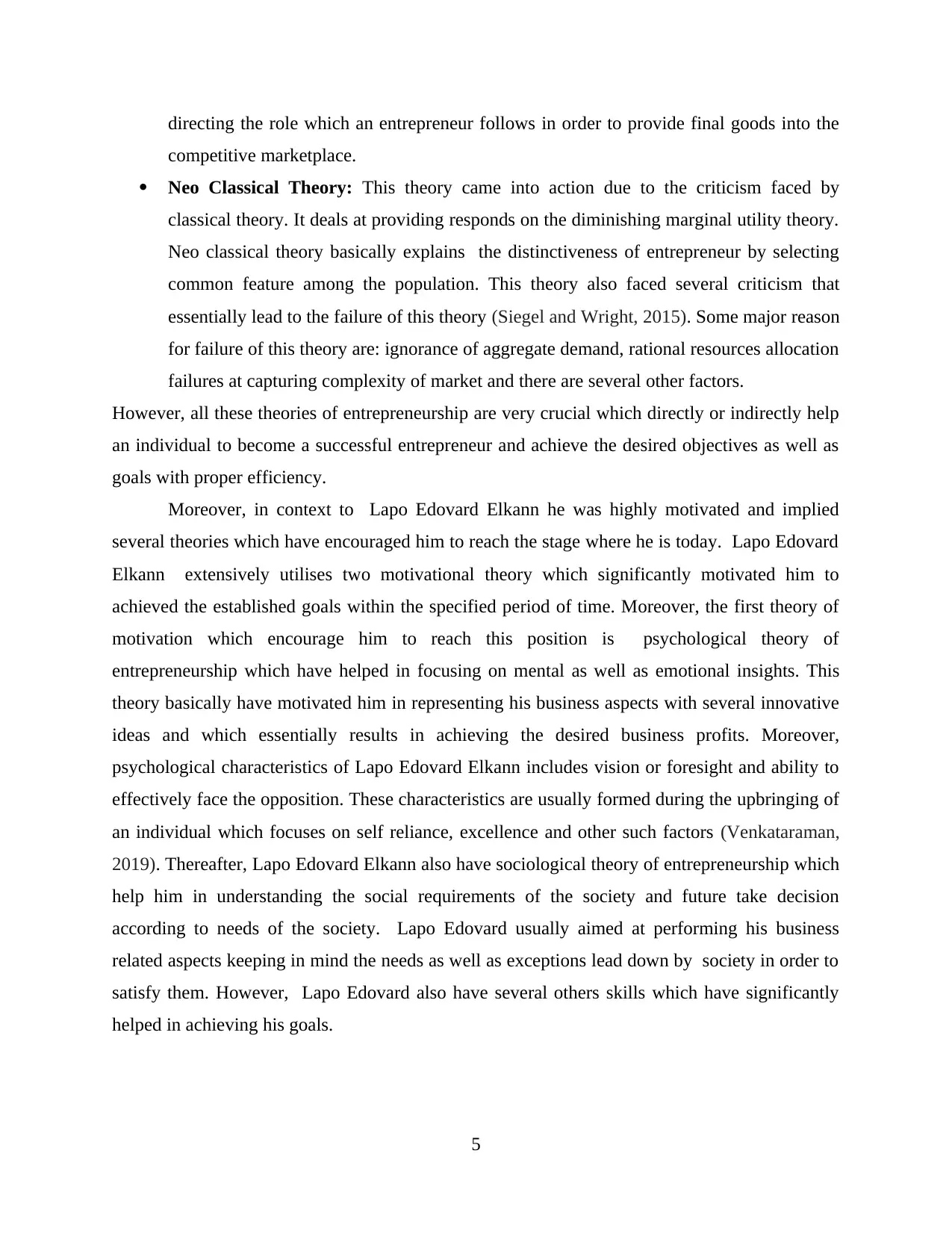
directing the role which an entrepreneur follows in order to provide final goods into the
competitive marketplace.
Neo Classical Theory: This theory came into action due to the criticism faced by
classical theory. It deals at providing responds on the diminishing marginal utility theory.
Neo classical theory basically explains the distinctiveness of entrepreneur by selecting
common feature among the population. This theory also faced several criticism that
essentially lead to the failure of this theory (Siegel and Wright, 2015). Some major reason
for failure of this theory are: ignorance of aggregate demand, rational resources allocation
failures at capturing complexity of market and there are several other factors.
However, all these theories of entrepreneurship are very crucial which directly or indirectly help
an individual to become a successful entrepreneur and achieve the desired objectives as well as
goals with proper efficiency.
Moreover, in context to Lapo Edovard Elkann he was highly motivated and implied
several theories which have encouraged him to reach the stage where he is today. Lapo Edovard
Elkann extensively utilises two motivational theory which significantly motivated him to
achieved the established goals within the specified period of time. Moreover, the first theory of
motivation which encourage him to reach this position is psychological theory of
entrepreneurship which have helped in focusing on mental as well as emotional insights. This
theory basically have motivated him in representing his business aspects with several innovative
ideas and which essentially results in achieving the desired business profits. Moreover,
psychological characteristics of Lapo Edovard Elkann includes vision or foresight and ability to
effectively face the opposition. These characteristics are usually formed during the upbringing of
an individual which focuses on self reliance, excellence and other such factors (Venkataraman,
2019). Thereafter, Lapo Edovard Elkann also have sociological theory of entrepreneurship which
help him in understanding the social requirements of the society and future take decision
according to needs of the society. Lapo Edovard usually aimed at performing his business
related aspects keeping in mind the needs as well as exceptions lead down by society in order to
satisfy them. However, Lapo Edovard also have several others skills which have significantly
helped in achieving his goals.
5
competitive marketplace.
Neo Classical Theory: This theory came into action due to the criticism faced by
classical theory. It deals at providing responds on the diminishing marginal utility theory.
Neo classical theory basically explains the distinctiveness of entrepreneur by selecting
common feature among the population. This theory also faced several criticism that
essentially lead to the failure of this theory (Siegel and Wright, 2015). Some major reason
for failure of this theory are: ignorance of aggregate demand, rational resources allocation
failures at capturing complexity of market and there are several other factors.
However, all these theories of entrepreneurship are very crucial which directly or indirectly help
an individual to become a successful entrepreneur and achieve the desired objectives as well as
goals with proper efficiency.
Moreover, in context to Lapo Edovard Elkann he was highly motivated and implied
several theories which have encouraged him to reach the stage where he is today. Lapo Edovard
Elkann extensively utilises two motivational theory which significantly motivated him to
achieved the established goals within the specified period of time. Moreover, the first theory of
motivation which encourage him to reach this position is psychological theory of
entrepreneurship which have helped in focusing on mental as well as emotional insights. This
theory basically have motivated him in representing his business aspects with several innovative
ideas and which essentially results in achieving the desired business profits. Moreover,
psychological characteristics of Lapo Edovard Elkann includes vision or foresight and ability to
effectively face the opposition. These characteristics are usually formed during the upbringing of
an individual which focuses on self reliance, excellence and other such factors (Venkataraman,
2019). Thereafter, Lapo Edovard Elkann also have sociological theory of entrepreneurship which
help him in understanding the social requirements of the society and future take decision
according to needs of the society. Lapo Edovard usually aimed at performing his business
related aspects keeping in mind the needs as well as exceptions lead down by society in order to
satisfy them. However, Lapo Edovard also have several others skills which have significantly
helped in achieving his goals.
5
Paraphrase This Document
Need a fresh take? Get an instant paraphrase of this document with our AI Paraphraser
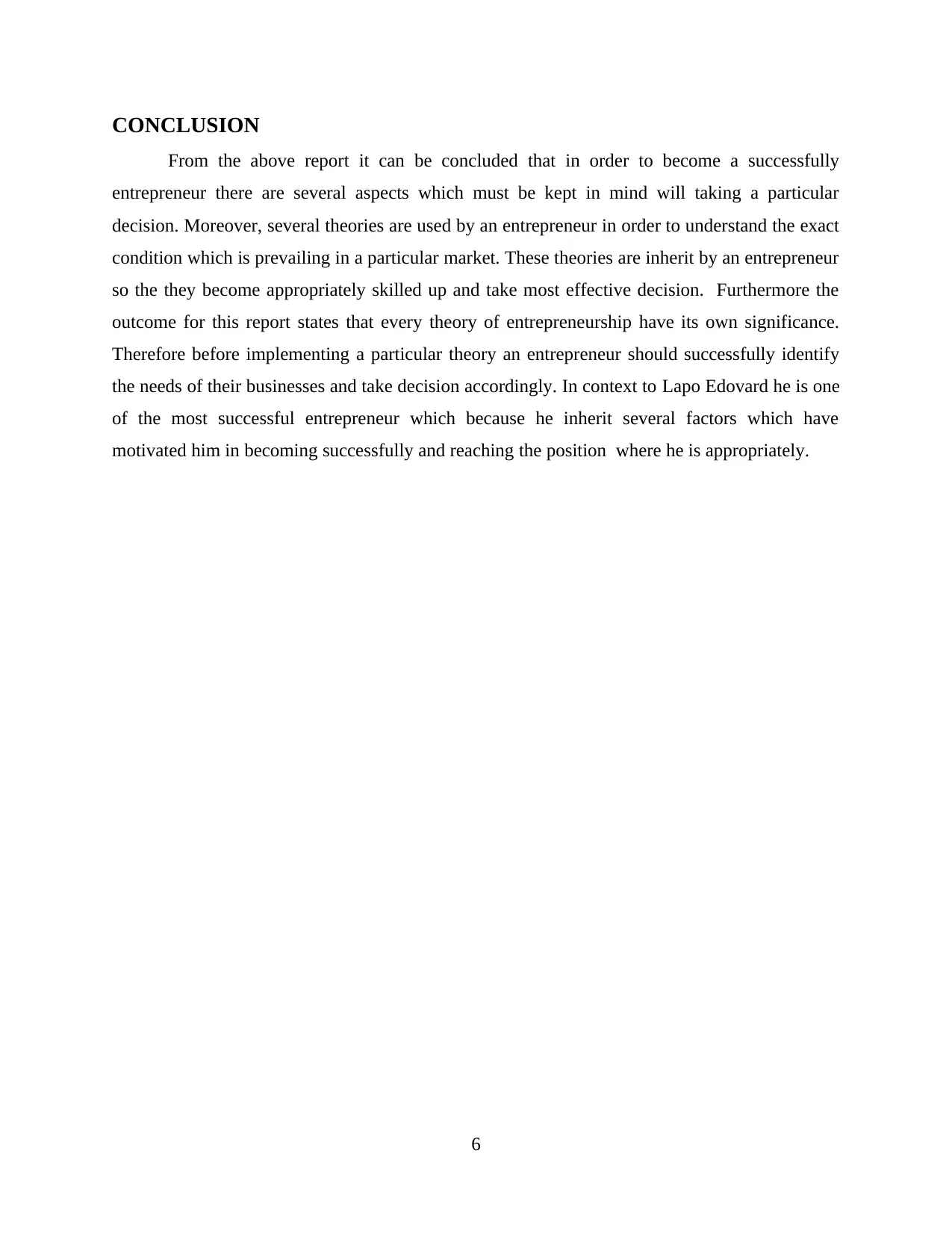
CONCLUSION
From the above report it can be concluded that in order to become a successfully
entrepreneur there are several aspects which must be kept in mind will taking a particular
decision. Moreover, several theories are used by an entrepreneur in order to understand the exact
condition which is prevailing in a particular market. These theories are inherit by an entrepreneur
so the they become appropriately skilled up and take most effective decision. Furthermore the
outcome for this report states that every theory of entrepreneurship have its own significance.
Therefore before implementing a particular theory an entrepreneur should successfully identify
the needs of their businesses and take decision accordingly. In context to Lapo Edovard he is one
of the most successful entrepreneur which because he inherit several factors which have
motivated him in becoming successfully and reaching the position where he is appropriately.
6
From the above report it can be concluded that in order to become a successfully
entrepreneur there are several aspects which must be kept in mind will taking a particular
decision. Moreover, several theories are used by an entrepreneur in order to understand the exact
condition which is prevailing in a particular market. These theories are inherit by an entrepreneur
so the they become appropriately skilled up and take most effective decision. Furthermore the
outcome for this report states that every theory of entrepreneurship have its own significance.
Therefore before implementing a particular theory an entrepreneur should successfully identify
the needs of their businesses and take decision accordingly. In context to Lapo Edovard he is one
of the most successful entrepreneur which because he inherit several factors which have
motivated him in becoming successfully and reaching the position where he is appropriately.
6
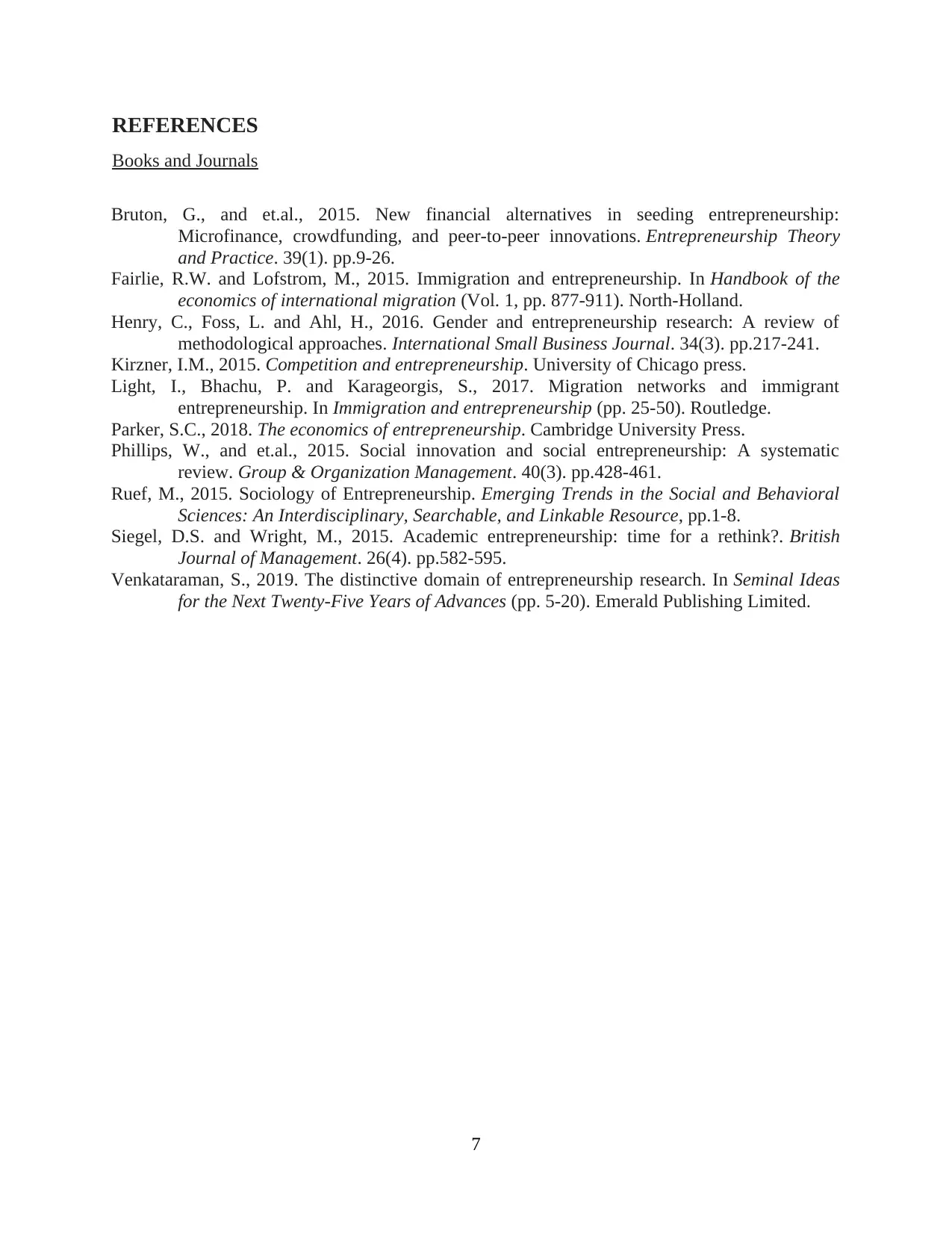
REFERENCES
Books and Journals
Bruton, G., and et.al., 2015. New financial alternatives in seeding entrepreneurship:
Microfinance, crowdfunding, and peer‐to‐peer innovations. Entrepreneurship Theory
and Practice. 39(1). pp.9-26.
Fairlie, R.W. and Lofstrom, M., 2015. Immigration and entrepreneurship. In Handbook of the
economics of international migration (Vol. 1, pp. 877-911). North-Holland.
Henry, C., Foss, L. and Ahl, H., 2016. Gender and entrepreneurship research: A review of
methodological approaches. International Small Business Journal. 34(3). pp.217-241.
Kirzner, I.M., 2015. Competition and entrepreneurship. University of Chicago press.
Light, I., Bhachu, P. and Karageorgis, S., 2017. Migration networks and immigrant
entrepreneurship. In Immigration and entrepreneurship (pp. 25-50). Routledge.
Parker, S.C., 2018. The economics of entrepreneurship. Cambridge University Press.
Phillips, W., and et.al., 2015. Social innovation and social entrepreneurship: A systematic
review. Group & Organization Management. 40(3). pp.428-461.
Ruef, M., 2015. Sociology of Entrepreneurship. Emerging Trends in the Social and Behavioral
Sciences: An Interdisciplinary, Searchable, and Linkable Resource, pp.1-8.
Siegel, D.S. and Wright, M., 2015. Academic entrepreneurship: time for a rethink?. British
Journal of Management. 26(4). pp.582-595.
Venkataraman, S., 2019. The distinctive domain of entrepreneurship research. In Seminal Ideas
for the Next Twenty-Five Years of Advances (pp. 5-20). Emerald Publishing Limited.
7
Books and Journals
Bruton, G., and et.al., 2015. New financial alternatives in seeding entrepreneurship:
Microfinance, crowdfunding, and peer‐to‐peer innovations. Entrepreneurship Theory
and Practice. 39(1). pp.9-26.
Fairlie, R.W. and Lofstrom, M., 2015. Immigration and entrepreneurship. In Handbook of the
economics of international migration (Vol. 1, pp. 877-911). North-Holland.
Henry, C., Foss, L. and Ahl, H., 2016. Gender and entrepreneurship research: A review of
methodological approaches. International Small Business Journal. 34(3). pp.217-241.
Kirzner, I.M., 2015. Competition and entrepreneurship. University of Chicago press.
Light, I., Bhachu, P. and Karageorgis, S., 2017. Migration networks and immigrant
entrepreneurship. In Immigration and entrepreneurship (pp. 25-50). Routledge.
Parker, S.C., 2018. The economics of entrepreneurship. Cambridge University Press.
Phillips, W., and et.al., 2015. Social innovation and social entrepreneurship: A systematic
review. Group & Organization Management. 40(3). pp.428-461.
Ruef, M., 2015. Sociology of Entrepreneurship. Emerging Trends in the Social and Behavioral
Sciences: An Interdisciplinary, Searchable, and Linkable Resource, pp.1-8.
Siegel, D.S. and Wright, M., 2015. Academic entrepreneurship: time for a rethink?. British
Journal of Management. 26(4). pp.582-595.
Venkataraman, S., 2019. The distinctive domain of entrepreneurship research. In Seminal Ideas
for the Next Twenty-Five Years of Advances (pp. 5-20). Emerald Publishing Limited.
7
⊘ This is a preview!⊘
Do you want full access?
Subscribe today to unlock all pages.

Trusted by 1+ million students worldwide
1 out of 9
Related Documents
Your All-in-One AI-Powered Toolkit for Academic Success.
+13062052269
info@desklib.com
Available 24*7 on WhatsApp / Email
![[object Object]](/_next/static/media/star-bottom.7253800d.svg)
Unlock your academic potential
Copyright © 2020–2026 A2Z Services. All Rights Reserved. Developed and managed by ZUCOL.




